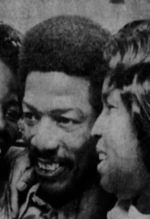 Tampa Bay Times (St. Petersburg, Florida). July 2, 1971. Convicted of the second-degree shooting death of a 17-year-old girl outside a nightclub in Miami, Florida, in 1967, David Ronald Wilson was released five years later when his appointed lawyer, Nicholas Tsamoutales, discovered that the lead witness for the State had lied in his testimony. On the night of September 7, 1966, 23-year-old Wilson was helping a friend work the door at the Cotton Club, a popular nightclub in Miami, Florida. Late that night, a 17-year-old girl, Earnestine Kinchen, arrived with three male friends. According to Wilson, while Kinchen was lingering outside the Club, she got into a loud argument with one of her companions, and Wilson approached the two in an effort to quiet them. As Wilson intervened, the male pulled out a gun and, in an attempt to protect himself, Wilson grabbed the girl and pulled her between himself and the gunman. As he did this, however, the gunman pulled the trigger and fatally shot Kinchen. Wilson immediately fled as the man with the gun fired multiple shots toward him. Finding cover, Wilson watched the men pull Kinchen into the car and drive off. Wilson was arrested later that night after Kinchen’s companions told police that Wilson had shot Kinchen. Wilson was brought to trial, and charged with second-degree murder. During the trial, at least two of the witnesses—Kinchen’s friends who were with her at the Cotton Club that night—testified to a different version of events. They claimed that Wilson would not admit Kinchen to the Club because she was too young, and when she slapped him, he threw her to the ground and shot her. On June 28, 1967, the jury, split between two greatly differing stories, deliberated for an entire day before handing down a guilty verdict. Judge Edward Klein sentenced Wilson to 20 years in the Raiford Florida State Prison. Wilson immediately began writing petitions for appeal. In early 1968, his appeal was sent to the Third District Court of Appeal of Florida. Wilson argued that the testimonies of the witnesses were extremely inconsistent, and the forensic investigation of the gunpowder on Kinchen’s chest suggested that she was shot while standing up, not lying on the ground. However, the Appeals Court found the inconsistency of the testimony insignificant and the forensics evidence unreliable, and affirmed his conviction. Wilson continued to write appeal petitions. By 1971, he had submitted more than 200 written appeals, motions, and letters. Injured while working on the prison road gang, Wilson underwent two surgeries but continued to file penciled motions. He also started work on six books based on prison life and his own experiences. In December 1970, Nicholas Tsamoutales, a young public defender, was appointed to assist Wilson with one of his petitions. Tsamoutales was able to help Wilson subpoena a new witness, Matthew Williams, who was also being held in the state prison. Williams, who had been present when Kinchen was murdered, refuted the claims of Kinchen’s friends about the events on the night of the crime, thus allowing Tsamoutales to petition for a new trial based on the perjured testimony by Kinchen’s friend. Both Wilson and Williams submitted to lie detector tests and were found to be speaking truthfully in relaying the events of Kinchen’s death. Bernie Patterson, one of the eyewitnesses for the state, was given a lie detector test as well and was found to have been deceptive in his testimony. On June 30, 1971, nearly five years after Wilson was arrested, Judge Ellen Morphonios set aside Wilson’s conviction at the request of the State. Tsamoutales told the court, “When I began to believe he was telling the truth, it became very important to me. This type of case makes you realize why you’re practicing law.” The charges against Wilson were dropped and he was released. After his release, Wilson immediately began working at a job that Tsamoutales found for him. Wilson told the press that he planned to go back to school to study mortuary science, finish his books, and father a son named Nicholas. “I would never have made it without him,” Wilson said of Tsamoutales. In 1973, Wilson sought $500,000 in compensation for his wrongful conviction but never received compensation. – Dan Osher and Dolores Kennedy
|